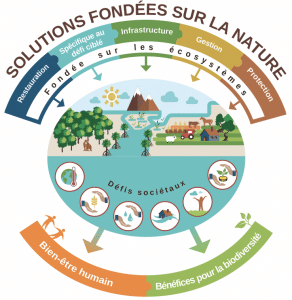Nature-based solutions (NbS) are defined by the IUCN as activities that protect, sustainably manage, or restore natural or modified ecosystems to directly address societal challenges in an effective and adaptive manner while ensuring human well-being and biodiversity benefits. These are ecosystem-based developments, structures, or processes that aim to adapt to current consequences. They are actions carried out by living organisms (species and ecosystems) that serve both humans and nature. Source : OFB
SfN relies on the ability of ecosystems to provide services such as reducing carbon in the atmosphere. Their potential to provide effective solutions is estimated at a 37% reduction in global emissions by 2030. (Griscom et al. 2017)

At ECT, these principles are put into practice through :
- Soil renaturation : transforming artificial or degraded land into natural, agricultural, or living landscapes.
- Biodiversity-friendly developments : creation of grasslands, woodlands, wetlands, or ecological corridors that encourage the return and preservation of local species.
- Valuation of ecosystem services: carbon storage in soils and vegetation, local climate regulation, air and water filtration.
A measurable impact
By leveraging the ability of ecosystems to store carbon and restore functional environments, ECT contributes to achieving climate goals: reducing emissions, adapting to climate change, and improving the living environment. These developments are designed by and for nature, in partnership with local authorities, associations, and stakeholders in the region.